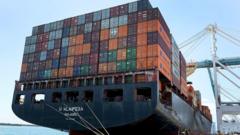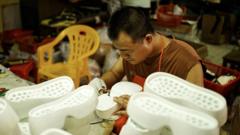The recent clash over a Chinese-owned steel mill in Scunthorpe threatens to undermine the U.K.'s ongoing diplomatic efforts with China, casting a shadow over future investments and cooperation.
**Tensions Rise Over British Steel Mill Amidst U.K.-China Relations**

**Tensions Rise Over British Steel Mill Amidst U.K.-China Relations**
Dispute Escalates After British Parliament's Emergency Measures to Secure Crucial Steel Production
Britain's government has sent multiple high-ranking officials to China this year, attempting to mend ties with a nation of strategic importance, especially in a trade landscape reshaped by American policies. However, a recent sudden move by British lawmakers to intervene at a Chinese-owned steel mill in Scunthorpe has raised alarms about the stability of these relations. This incident, centered on the future of the plant's two essential blast furnaces, has put Prime Minister Keir Starmer's strategy under scrutiny, particularly as fears of U.S. tariffs loom and the risk of global trade disputes intensifies.
The British Parliament's decision comes after the Chinese firm, Jingye, threatened to close the mill, which produces crude steel deemed critical for construction projects and employs 2,700 local workers. The British government, after finding negotiations ineffective, accused Jingye of not placing orders for necessary raw materials, raising concerns about the plant's viability.
Business Secretary Jonathan Reynolds voiced a need to reassess the U.K.'s openness to Chinese investments in sensitive sectors, stating that the uncertainty surrounding the steel industry warranted caution. His remarks highlight a growing sentiment within the government, advocating for a more strategic and protective approach towards domestic industries, particularly in light of the protective measures and tariffs introduced by the Trump administration. The unfolding situation at the Scunthorpe steel mill epitomizes the delicate balance Britain must maintain as it navigates its complex relationship with China under the shadow of broader geopolitical shifts.
The British Parliament's decision comes after the Chinese firm, Jingye, threatened to close the mill, which produces crude steel deemed critical for construction projects and employs 2,700 local workers. The British government, after finding negotiations ineffective, accused Jingye of not placing orders for necessary raw materials, raising concerns about the plant's viability.
Business Secretary Jonathan Reynolds voiced a need to reassess the U.K.'s openness to Chinese investments in sensitive sectors, stating that the uncertainty surrounding the steel industry warranted caution. His remarks highlight a growing sentiment within the government, advocating for a more strategic and protective approach towards domestic industries, particularly in light of the protective measures and tariffs introduced by the Trump administration. The unfolding situation at the Scunthorpe steel mill epitomizes the delicate balance Britain must maintain as it navigates its complex relationship with China under the shadow of broader geopolitical shifts.






















